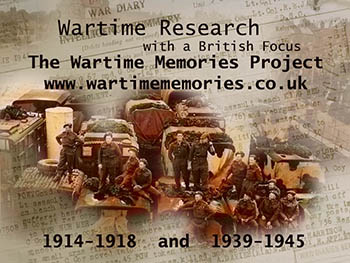|
|
|
Battle of Bardia
The Battle of Bardia was fought over two days from the 3rd of January 1941, and was part the Western Desert Campaign.
3rd Jan 1941 Attack Made
4th Jan 1941 Situation Obscure
If you can provide any additional information, please add it here.
|
Those known to have fought in Battle of Bardia during the Second World War 1939-1945. The names on this list have been submitted by relatives, friends, neighbours and others who wish to remember them, if you have any names to add or any recollections or photos of those listed,
please
Add a Name to this List
Records of Battle of Bardia from other sources.
|
|
|
The Wartime Memories Project is the original WW1 and WW2 commemoration website.
Announcements

- 1st of September 2024 marks 25 years since the launch of the Wartime Memories Project. Thanks to everyone who has supported us over this time.
- The Wartime Memories Project has been running for 25 years. If you would like to support us, a donation, no matter how small, would be much appreciated, annually we need to raise enough funds to pay for our web hosting and admin or this site will vanish from the web.
- 26th Mar 2025 - Please note we currently have a huge backlog of submitted material, our volunteers are working through this as quickly as possible and all names, stories and photos will be added to the site. If you have already submitted a story to the site and your UID reference number is higher than
265607 your information is still in the queue, please do not resubmit, we are working through them as quickly as possible.
- Looking for help with Family History Research?
Please read our Family History FAQs
- The free to access section of The Wartime Memories Project website is run by volunteers and funded by donations from our visitors. If the information here has been helpful or you have enjoyed reaching the stories please conside making a donation, no matter how small, would be much appreciated, annually we need to raise enough funds to pay for our web hosting or this site will vanish from the web.
If you enjoy this site
please consider making a donation.
Want to find out more about your relative's service? Want to know what life was like during the War? Our
Library contains an ever growing number diary entries, personal letters and other documents, most transcribed into plain text. |
|
Wanted: Digital copies of Group photographs, Scrapbooks, Autograph books, photo albums, newspaper clippings, letters, postcards and ephemera relating to WW2. We would like to obtain digital copies of any documents or photographs relating to WW2 you may have at home. If you have any unwanted
photographs, documents or items from the First or Second World War, please do not destroy them.
The Wartime Memories Project will give them a good home and ensure that they are used for educational purposes. Please get in touch for the postal address, do not sent them to our PO Box as packages are not accepted.
World War 1 One ww1 wwII second 1939 1945 battalion
Did you know? We also have a section on The Great War. and a
Timecapsule to preserve stories from other conflicts for future generations.
|
|
Want to know more about Battle of Bardia? There are:3 items tagged Battle of Bardia available in our Library There are:3 items tagged Battle of Bardia available in our Library 
These include information on officers, regimental histories, letters, diary entries, personal accounts and information about actions during the Second World War. |
|
Pte Paul John Leonard Randles Umvoti Mounted Rifles Paul Randles was headboy of his school Hilton College, Natal, S.Africa. He captained the 1st XV and 1st XI Cricket.
In late 1940 he volunteered to join the South African Army (his father had served the Empire in WWI) and was assigned to a local regiment, the Umvoti Mounted Rifles. Following training in South Africa and Botswana the regiment embarked from Durban in July 1941 bound for Egypt.
In 1941, the South African Army was comprised of two infantry divisions. The First Division was held in reserve while the Second Division was deployed to North Africa in support of Allied forces fighting the Desert War. The Second Division comprised 3rd, 4th and 6th Infantry Brigades. The Umvoti Mounted Rifles were part of 4th Infantry Brigade.
After weeks of acclimatisation and training in desert warfare Paul was in action in the battles at Bardia and Sollum. In June 1942 the entire SA Second Division formed part of the Allied forces defending Tobruk. When Rommel attacked and captured Tobruk he handed all Allied POWs to the Italian Army.
Paul was shipped to Italy where he was held in a number of POW camps. When Italy declared an Armistice on 8th September 1943 Commandants in many of the camps in Italy released their captives. Paul and three others were freed from Campo PG49, Fontanellato near Parma. They headed South on foot along the Apennine Mountains relying on peasant farmers (contadini) for shelter and food. They had reached Frosinone, south of Rome by early December.
Unable to cross the Gustav Line, heavily fortified as it had become, they sheltered in a stone hut on a mountainside near San Donato Val di Comino. They were fed and clothed by a local family. They left the hut in January as they felt they were putting the family at too great a risk. Some days later their location was given away and they were recaptured by the Germans.
Paul and his pals were trucked to Bolzano and then entrained to Germany. Paul spent the remainder of the war as a POW first in Stalag VIIA Moosberg, near Munich and Stalag IVG Oschatz, a work camp near Leipzig. There they were witness to the Allied bombing raids on Chemnitz and Dresden. In April 1945 their German guards forced the prisoners to march away from the camp. During the march they encountered groups of prisoners from concentration camps in Poland and Czechoslovakia. They finally met American patrols and were free.
They commandeered a military ambulance and drove West through Germany and Holland. They crossed to England by ferry.
Paul spent 4 months in England. He visited his aunt in Bexhill-on-Sea and spent a while in London taking part in the victory celebrations. He returned to South Africa late in 1945 where he was demobilised,
Paul joined his father's legal practice in Pietermaritzburg and married Diane Tweedie. Paul went on to become senior partner at Randles Davis & Wood. He played provincial rugby and cricket representing Natal. He and Diane had 5 children: four daughters and a son. Paul died in 1978 aged 56.
Alexander Irvine-Fortescue
|
Pte. Benjamin Evans 1st Btn. Welch Regiment My late father Benjamin Evans joined the West Monmouthshire Regiment in 1939, aged 20. After basic training, he transferred to the 1st Battalion, Welch Regiment where he trained for desert warfare. Then he sailed from Plymouth around Africa to Egypt. In 1940, he saw action in the battles of Mersa Matruh and Bardia. In 1942, he was captured by Italian troops and was a POW in Italy until the Italians capitulated. He then became a POW of the Germans, who took him to a camp in Poland where he remained until early 1945, when the Russians were closing in from the east and the Germans marched all of the POWs to a camp at Lamsdorf in Germany. Along the way he had frostbite, which resulted in all of his toes being amputated. He was liberated from Lamsdorf by the Americans and flown back home where he spent a year in hospital, being discharged in 1946.
|
Gnr. John Braithwaite 18th Field Regiment Royal Artillery 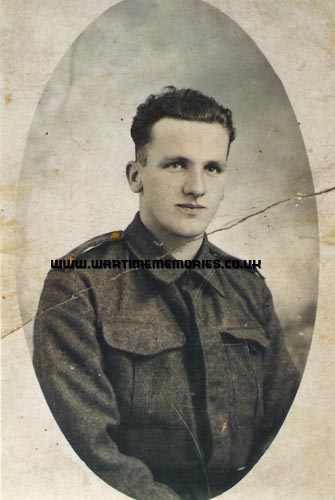 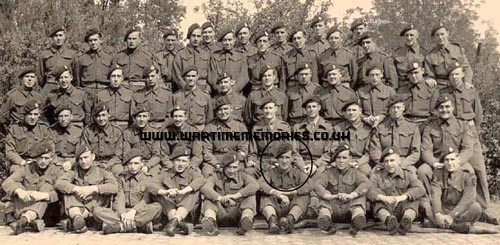 In 1939, John Braithwaite went to France with the British Expeditionary Force, serving in the Royal Artillery.
In June 1940 s the Germans pushed the BEF back to the coast, he was one who offered to hold the beachhead during the Dunkirk evacuation. When the last troops had been withdrawn, he dived into the surf and being a strong swimmer, struck out towards England. He was rescued by one of the small boats several miles off the French coast, and landed in Margate in the early hours of his 21st birthday.
In July 1940 John was then accepted for 'hazardous duties' and was posted to 23rd Heavy Training Battalion (later renamed No.3 Special Service Battalion). After 6 months tough training, these men became some of the first Commando.
John was posted to No.7 Commando in January 1941 (which merged with 4th Special Service Battalion en route to the Lofoten Islands for the Operation Claymore raid in March 1941, to become No.4 Commando).
No.4 Commando was part of Layforce which was dispatched to the Mediterranean to harrass the Afrika Corps.
John recalled being offloaded from a submarine for the disastrous raid on Bardia in April 1941.
Soon after, the Commandos were sent to defend Crete. They were grossly under-equipped, but fought hard against the overwhelming might of the German paratroopers but, of the 800 commandos sent there, about 600 were listed as killed, missing or wounded. Only 23 officers and 156 ORs escaped.
On the 29th of May 1941 John was evacuated aboard HMS Orion, the cruiser was struck by Stuka bombs, with 260 deaths and 280 wounded. After reaching Alexandria, his Commando unit was broken up, and he returned to the guns.
On the 21st of January 1942, he was injured and captured in Tobruk.
In late 1942, after recovering in a POW hospital in southern Italy, POW No.258058 John Braithwaite was transferred to the Italian-run Campo 52 near Genoa. Conditions were bad and, as supplies grew shorter, the men caught rats and cats to supplement their food. John and several others made an escape from Campo 52 but were recaptured and sent to Campo 70 Monturano (near Parma) and later to Stalag 339 Trieste in northern Italy. As the Allies drew nearer, he was transferred to a work-camp near Dresden called Arb.Komm.855. Later he was moved to Stalag IVB, 30 miles north of Dresden. From here, he escaped with a New Zealander called Arnold Franklin but was caught near the Czech border.
Upon recapture in April 1944, he was put in Stalag IVA at Hohnstein, where he worked in jobs associated with a nearby lignite coalmine.
John stayed in this camp until liberation.
He later emigrated to New Zealand, and served for two years with the RNZ Artillery in Korea, but that's another story.
I would happy to hear from anyone with more details about any of the above. Feel free to contact me.
|
Pte. David Bladen Die Middelandse Regimant 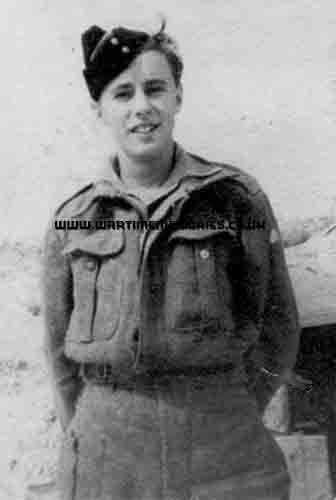 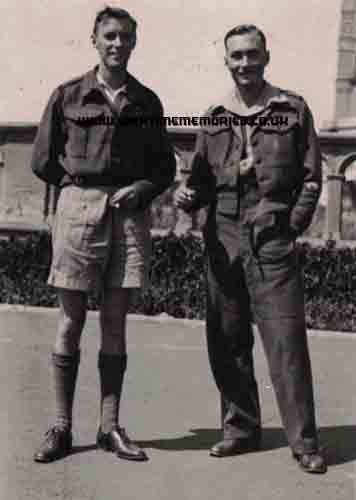 David Bladen enlisted in the South African Army on 16th April 1940, in the service of South Africa and the British Commonwealth of Nations. His designation was Vickers Machine Gun team member.
David served in Die Middelandse Regiment in the 2nd South African Division and saw service at Libya, North Africa. He was wounded in Bardia on 2nd of January 1942 and returned to the front in time to be taken POW at Tobruk on 21st of June 1942.
David spent six months in a POW camp at Benghazi, and was then shipped to Italy. He worked as farm labourer on an estate near Brindisi until September 1943 when he was trucked to Germany (Stalag 8A at Goerlitz). He was sent to work in a sugar factory in Schweidnitz in southern Poland for nine months. David returned to Goerlitz for six months, and then was sent to a lumber mill in the Black Forest. He returned to Goerlitz in time to start the 500-mile walk westward, ending up at Kreiensen, from which he escaped in April 1945.
He was demobilized in May 1945. He returned to England and then to South Africa.
|
Pte. Albert Ignatius "Paddy" Roachock 2/6th Battalion My cousin, Albert Roachock was born in the 1st of Feb 1905 in Clare, South Australia. He enlisted on the 24th of Jun 1940, naming his his mother Elizabeth as next of kin. He was taken Prisoner of War.
On Satuday 21st of June 1941 the Weekly Times of Melbourne reported "Victorians Casualties ... missing Roachock, Pte. A., Albury (Inf.)".
Thusady 17th of June 1941 The Argus (Melbourne) reported: "Prisoner of War, previously reported mising... Roachock, A. Pte., Albury, Inf."
Saturday 28th June 1941 The Argus (Melbourne): "Prisoners of War: Names of 170 Victorian privates who are prisoners of war were yesterday released by the Red Cross Society who received their information by cable from International Red Cross at Geneva. All are at P.O.W. Camp Corinthia. They are: Roachock A. (29667);..."
Fri 25 May 1941 The Age (Melbourne) reported:
"A.I.F. War prisoners. 800 of 3438 sail for Australia. Names of 1958 A.I.F. prisoners of war repatriated to England from western Europe in the week ended last Saturday were released yesterday in advance of the official army casualty list. They include 674 Victorians, a list of whom is set out here under.
The Acting Minister for the Army Senator Fraser, in announcing the names from Canberra yesterday; said that between April 1 and May 19 the total number of A.I.F. prisoners to reach England from Europe was 3438, leaving only approximately 2000 still awaiting transfer from Europe. Latest reports indicated that the health and morale of the men arriving in England continued to be surprisingly good. Nearly 800 repatriates had already sailed for Australia. Other drafts would be sent as shipping became available. The A.I.F. reception group camp at Eastbourne, added the Minister, was recently visited by the Duchess of Kent and also by General Sir Ronald Adam, adjutant-general, War Office."
Fri 25 May 1945 The Argus (Melbourne) reported "A.I.F. men repatriated from Germany. In the week ended Saturday, May 19, 1,958 AIF prisoners of war recovered in Western Europe were repatriated to England, Senator Fraser Acting Army Minister, said yesterday. Between April 1 and May
19 the total number of AIF prisoners reaching England from Europe was 3,458, leaving only approximately 2,000 still awaiting transfer from Europe. The health and morale of men arriving in England continued to be surprisingly good, according to latest reports. Nearly 800 repatriates had already sailed for Australia, Senator Fraser stated, and other drafts would be sent as shipping became available. Following are the men who arrived in England during the week ending May 19. There were 673 Victorians among them. Next of kin have been notified."
The South Australian newspapers also mentioned him and members of his family. On Saturday 14th of June 1941 The Advertiser (Adelaide) reported "everything points to the German invasion of Greece (began 6 April 1941) and the German conquest of the island of Crete (ended 1 June); the 6th Australian Division had been sent to Greece.
Victoria Missing. ... Pte. A. Roachock, VX29667, Inf., Albury; ...
Mrs. Margaret Dollman. of Clifton street, Prospect, Adelaide, has received word that her husband, Sergeant Herbert Douglas Dollman, is missing. After serving at Bardia, he was wounded at Tobruk, and after being in hospital for two months, returned to his unit. He went to Greece and was last heard of at Crete. He is a son of Colonel Walter Dollman. Sergeant Dollman left Australia on January 9 last year."
Sat 28th of June 1941 The Advertiser Melbourne. "June 27. The names of 170 Victorian privates who are prisoners of war are released by the Red Cross Society, who received their information by cable from the International Red Cross at Geneva. All are at Camp Corinthia: A. Roachock, 29,667"
Fri 28 May 1941 The Southern Cross (Adelaide) "this weekly was the Organ of the Catholic Church in South Australia; so clearly it was well-known that the Victorian Albert Ignatius Roachock was in fact a South Australian from Karoonda"
Catholic Patriotic Activities. Catholic Soldiers' Guild. "All enquiries as to missing men, or messages to those already located, should be made personally or by letter to the Catholic Soldiers' Guild, Todd Building, Victoria Square, Adelaide, or Box 36A, G.P.O., Adelaide. The service is free to all denominations. Previously Missing, Now Confirmed as Prisoner of War. Dvr. E. B. H. Briggs (A.I.F.), Melrose; Pte. F. P. Colgan (A.I.F.), Pennington; Pte. G. M. Daly, Spalding; Pte. A. I. Roachock (A.I.F.), Karoonda.
The Executive and members of the Guild extend their deepest sympathy to the bereaved relatives of those gallant men who have made the supreme sacrifice.
Mass is offered on the first Sunday of each month in St. Francis Xavier's Cathedral for the repose of the souls of deceased comrades. Mass is also celebrated every week for the spiritual and temporal welfare of all Australians who are in the Navy, Army, or Air Force."
Private Casualty Advices. "Mrs. P. L. Roachock, of Borrika, has received a cable stating that Pte. A. Roachock, of Karoonda, who was a prisoner of war for four and a half years in Germany, is at the AIF reception camp, Eastbourne, England."
Fri 1 Jun 1945 The Southern Cross: "The following previously reported prisoners of war are now reported to be safe and well in England: Capt. D. S. Hogarth (A.I.F.), Walkerville; W.O. [Warrant Officer] A. J. Condon (R.A.A.F.), Prospect; Pte. L. Kostera (A.I.F.), Balaklava; Pte. A. Roachock (A.I.F.), Karoonda; Pte. B. P. Sheedy (A.I.F.), Peterhead."
Karoonda, 6th August " ...Gnr. N. Hancock (who has been a prisoner of war in Germany) and his wife are spending a few days with his sister, Mrs. C. C. Gellert. Pte. Alby Roachock, who has just been repatriated from a POW camp in Germany, visited his father over the week-end."
Albert was discharged on the 16th of Nov 1945. His brother Thomas had been killed in Belgium in 1917 and his cousin Carl Albert Bahnisch was killed at Tobruk on 18th of April 1941.
|
Cpl. Leslie Clarence Bullard B Company, 10 Platoon 2/6th Battalion My uncle, Leslie Clarence Bullard, was a POW in the same camp as Walter Gossner. I have the original photos of Walter and many other men who were in Stalag A XVIII in Wolfberg Germany. I have around 120 photos including on of a black dog named 'Winston Churchill' - would love to know who he belonged to and what became of him.
Leslie Bullard enlisted in Victoria in 1939 and sailed from Melbourne on 14 April 1941. He was involved in the Battle of Bardia - 3rd Jan to 5th Jan 1941. He landed in Greece on 12th April 1941 and was taken POW on 26th April 1941 in Crete. He was held in the Corinth hell camp from 26 April 1941 until 7 June 1941. In his own handwriting in his Red Australiam Soldiers' Handbook he states "I had the pleasure of seeing the rat Himmler at Corinth Hill today" - 20 May 1941.
Leslie spent three birthdays in POW camps in Germany, he spent his 23 birthday (1941) in Salonika on a biscuit and water, his 24th birthday (1942) at Niklasdorf near Leobon and spent his 25th birthday (1943) at Klagenfurt POW camp. Leslie escaped on 30th July 1944. He joined with the Yugoslavia partisans on 10 August 1944. He rejoned the allied forces in Italy on 21 September 1944. He was discharged from the Army in May 1945, never married and died in 1967 aged 45 years old. Unfortunately I did not know him personally as I lived on the other side of Australia and he lived in Victoria. If anyone has a recollection of their relative also being a POW in the same camps around the same time, please make contact as I have a list of names on some of the photos and some Army Registration Numbers which could identify your relative.
|
Recomended Reading.Available at discounted prices.
|
|
|


